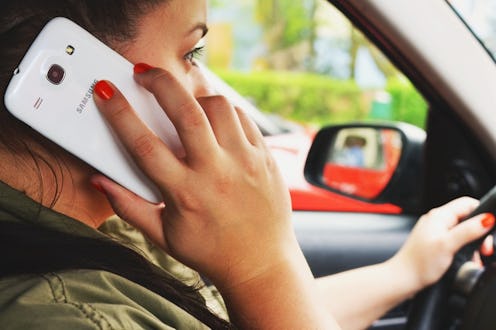Life
Can This Ride-Sharing Service Solve A Big Problem?

News of alleged assault and harassment for women both using ride-sharing services and driving for them seem to be forever on the rise — but one company is offering a new solution: Chariot for Women, a women-only ride-sharing service. The Boston-based start-up, which hires only female drives and shuttles only women and children, is going to fingerprint every driver they employ; furthermore, they'll also work with law enforcement to run background checks on each and every driver. They're even going to use a safe word that both drivers and passengers will have to confirm before a ride can begin. Sounds amazing, right? Well, in some ways, yes, it is. Women now have one more safe place to go when they need a ride, free from the fear and risks of assault and harassment; but once again, we're teaching women how not to get hurt, instead of teaching people not to hurt others in the first place.
It's such a complicated argument; I even debated it with my boyfriend because my head started spinning. It's wonderful that women have this option. Now if we get into a stranger's car, or if we welcome a stranger into our own car, we can at least feel safer (although it's worth noting that men aren't the only people who assault others; women can and do, as well). And I don't doubt that a business like Chariot for Women will help decrease instances of assault and harassment against women in ride-sharing situations.
But in the same breath, it can be argued that we're almost excusing bad behavior — accepting it is as the norm. We're saying, "Oh well. Rape is there. Harassment isn't going anywhere. Assault will never stop. Since we can't control it, here's an escape." It's a temporary fix, a tiny bandage on a huge, festering wound.
Then again, will we ever stop harassment 100 percent? My boyfriend's argument is that we won't. He explains that some people can't be fixed, that we will never get through to some people, that we will never be able to get them to understand why committing these deplorable behaviors is wrong. The only solution, in this case, is to avoid these people completely. It's sad, but although I still stand by the "teach people not to hurt others at all" argument, I can't say I disagree with him. This is where services like Chariot for Women are a vital necessity.
However, my boyfriend and I decided that the solution might actually be a combination of the two sides: Offering a safe retreat for women, but only as a last resort. I still wholeheartedly believe that the main focus should be squashing rape culture, destroying instances of assault and harassment, and creating an environment where these happenings are no longer tolerated, excused, or considered at all acceptable. Period.
I did, however, start feeling guilty for putting a female-centric service in second place. Does this make me less of a feminist? Shouldn't we all be in support of this?
Well, I am in support of it. But I also wonder what the idea of a service that removes men from the equation completely — a service that is essentially telling us that men are such a huge, unavoidable problem that we just need to eliminate them from this business — means for feminism. The service has no male drivers. No male passengers, except for children. It's all women. But feminism isn't about the separation of genders, or of any other groups; it's about all people liiving in a world with absolute harmony and equality. So are these two ideas at odds with each other? I'm not sure.
Moreover, Chariot for Women isn't the first company to offer women their own private solution, and it won't be the last. Recently, more feminist Internet users and websites are taking their conversations to subscription-only newsletters in an attempt to remove the hateful and often threatening comments they receive. This is yet another example of people trying to create an environment where instead of a problem being extinguished, it's being barred entry entirely — both a positive and a negative, but still not a long-term solution to a much bigger problem.
At the end of the day, I think we can agree that a company like Chariot for Women is here to do good and help people. The question, however, still remains: How will we create an environment where women don't need to be shielded in the first place? Because that, more than anything else, is what we need.